Analysing Organisational Behaviour at BBC: Culture and Motivation
VerifiedAdded on 2020/11/23
|13
|4083
|478
Report
AI Summary
This report provides a comprehensive analysis of organizational behavior within the British Broadcasting Corporation (BBC). It examines the influence of culture, politics, and power dynamics on employee behavior, utilizing Handy's culture model to assess the organization's structure. The report delves into content and process theories of motivation, including Maslow's hierarchy of needs and Vroom's expectancy theory, to understand how to improve motivation levels and achieve organizational goals. It further explores the differences between effective and ineffective teams, as well as various team types. Furthermore, the report identifies and analyzes organizational concepts and theories to enhance team performance, while also addressing barriers to effective performance within BBC. The analysis incorporates key behavioral theories of motivation, such as Herzberg's Two-Factor Theory and Adams' Equity Theory, to influence employee behavior positively. The report concludes with an overview of these concepts and their practical application within BBC.
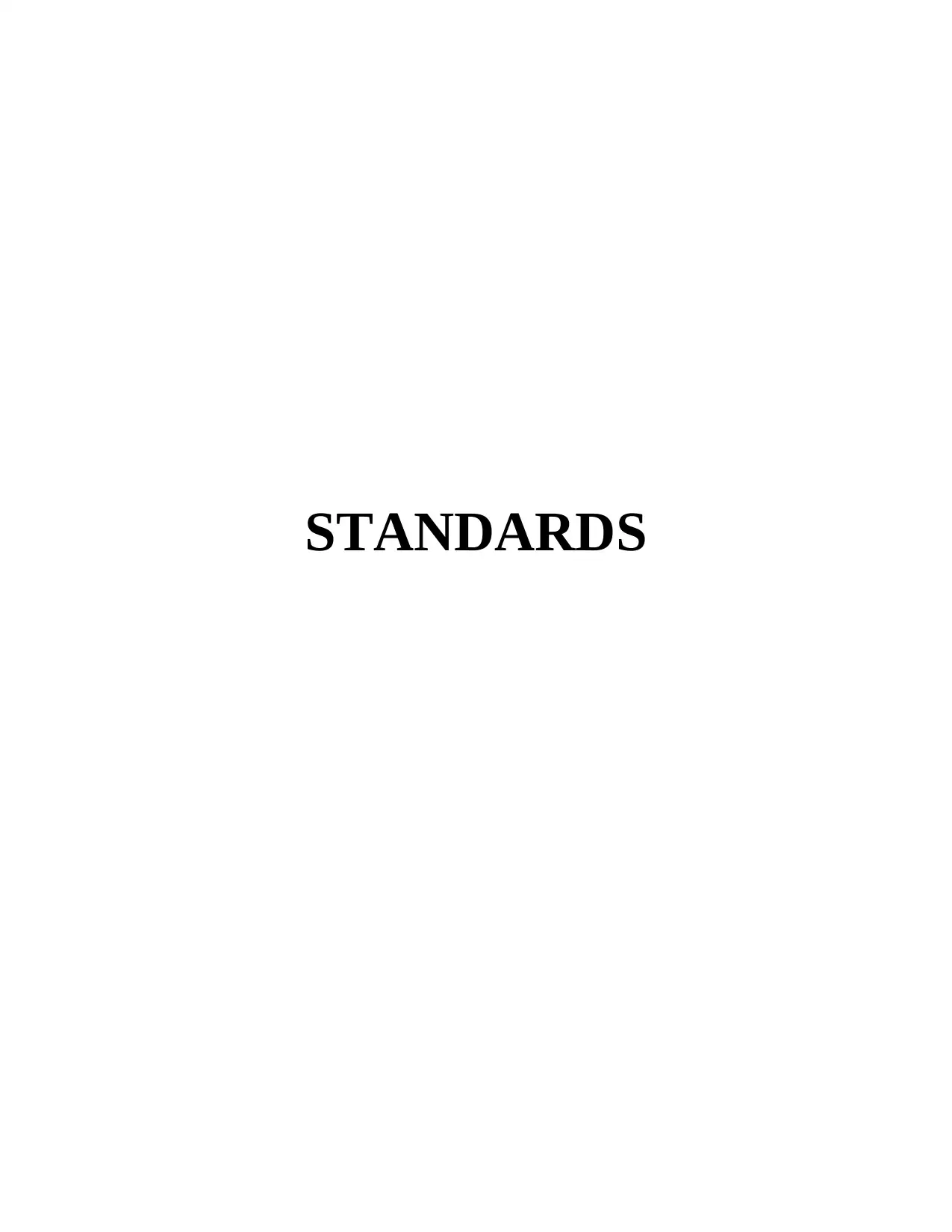
STANDARDS
Paraphrase This Document
Need a fresh take? Get an instant paraphrase of this document with our AI Paraphraser
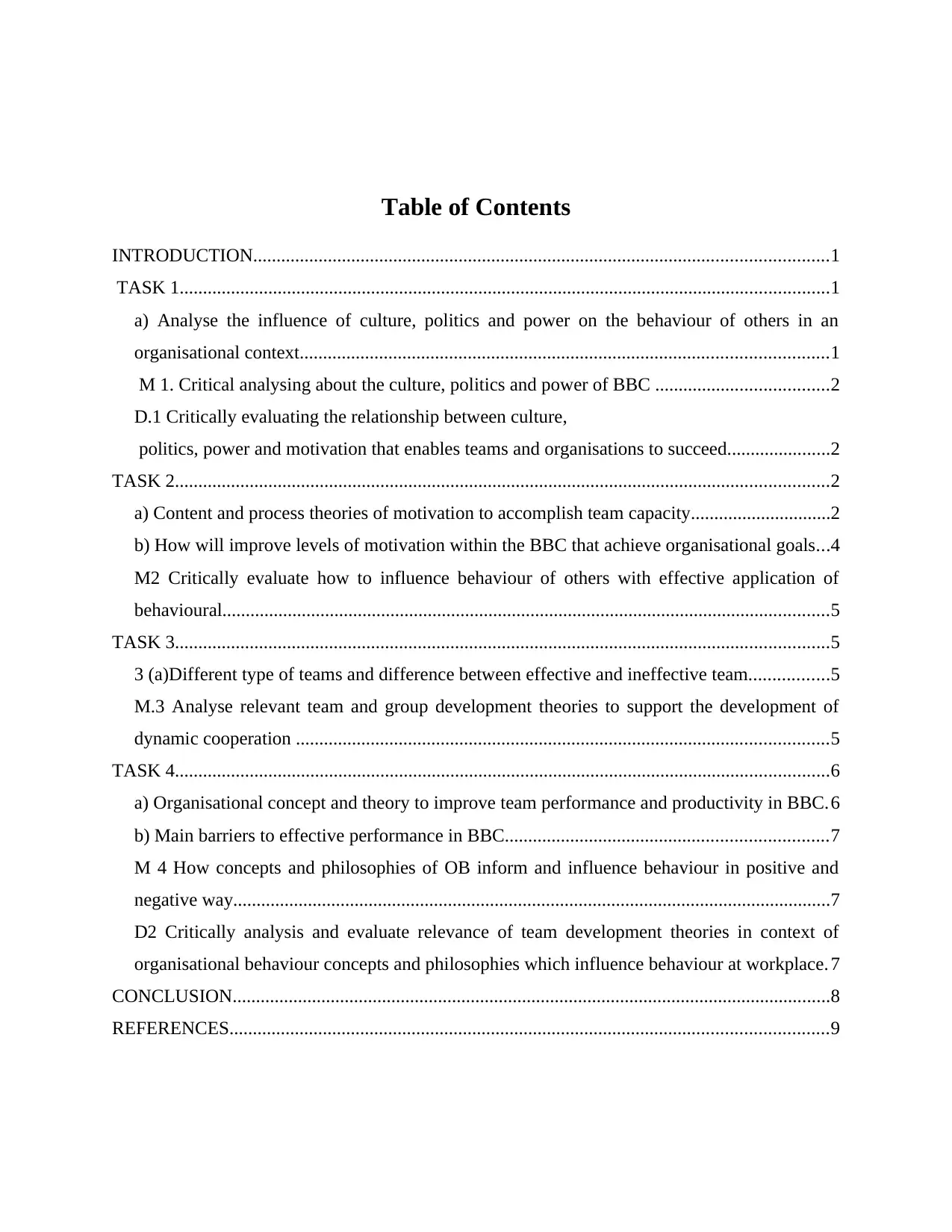
Table of Contents
INTRODUCTION...........................................................................................................................1
TASK 1...........................................................................................................................................1
a) Analyse the influence of culture, politics and power on the behaviour of others in an
organisational context.................................................................................................................1
M 1. Critical analysing about the culture, politics and power of BBC .....................................2
D.1 Critically evaluating the relationship between culture,
politics, power and motivation that enables teams and organisations to succeed......................2
TASK 2............................................................................................................................................2
a) Content and process theories of motivation to accomplish team capacity..............................2
b) How will improve levels of motivation within the BBC that achieve organisational goals...4
M2 Critically evaluate how to influence behaviour of others with effective application of
behavioural..................................................................................................................................5
TASK 3............................................................................................................................................5
3 (a)Different type of teams and difference between effective and ineffective team.................5
M.3 Analyse relevant team and group development theories to support the development of
dynamic cooperation ..................................................................................................................5
TASK 4............................................................................................................................................6
a) Organisational concept and theory to improve team performance and productivity in BBC.6
b) Main barriers to effective performance in BBC.....................................................................7
M 4 How concepts and philosophies of OB inform and influence behaviour in positive and
negative way................................................................................................................................7
D2 Critically analysis and evaluate relevance of team development theories in context of
organisational behaviour concepts and philosophies which influence behaviour at workplace. 7
CONCLUSION................................................................................................................................8
REFERENCES................................................................................................................................9
INTRODUCTION...........................................................................................................................1
TASK 1...........................................................................................................................................1
a) Analyse the influence of culture, politics and power on the behaviour of others in an
organisational context.................................................................................................................1
M 1. Critical analysing about the culture, politics and power of BBC .....................................2
D.1 Critically evaluating the relationship between culture,
politics, power and motivation that enables teams and organisations to succeed......................2
TASK 2............................................................................................................................................2
a) Content and process theories of motivation to accomplish team capacity..............................2
b) How will improve levels of motivation within the BBC that achieve organisational goals...4
M2 Critically evaluate how to influence behaviour of others with effective application of
behavioural..................................................................................................................................5
TASK 3............................................................................................................................................5
3 (a)Different type of teams and difference between effective and ineffective team.................5
M.3 Analyse relevant team and group development theories to support the development of
dynamic cooperation ..................................................................................................................5
TASK 4............................................................................................................................................6
a) Organisational concept and theory to improve team performance and productivity in BBC.6
b) Main barriers to effective performance in BBC.....................................................................7
M 4 How concepts and philosophies of OB inform and influence behaviour in positive and
negative way................................................................................................................................7
D2 Critically analysis and evaluate relevance of team development theories in context of
organisational behaviour concepts and philosophies which influence behaviour at workplace. 7
CONCLUSION................................................................................................................................8
REFERENCES................................................................................................................................9
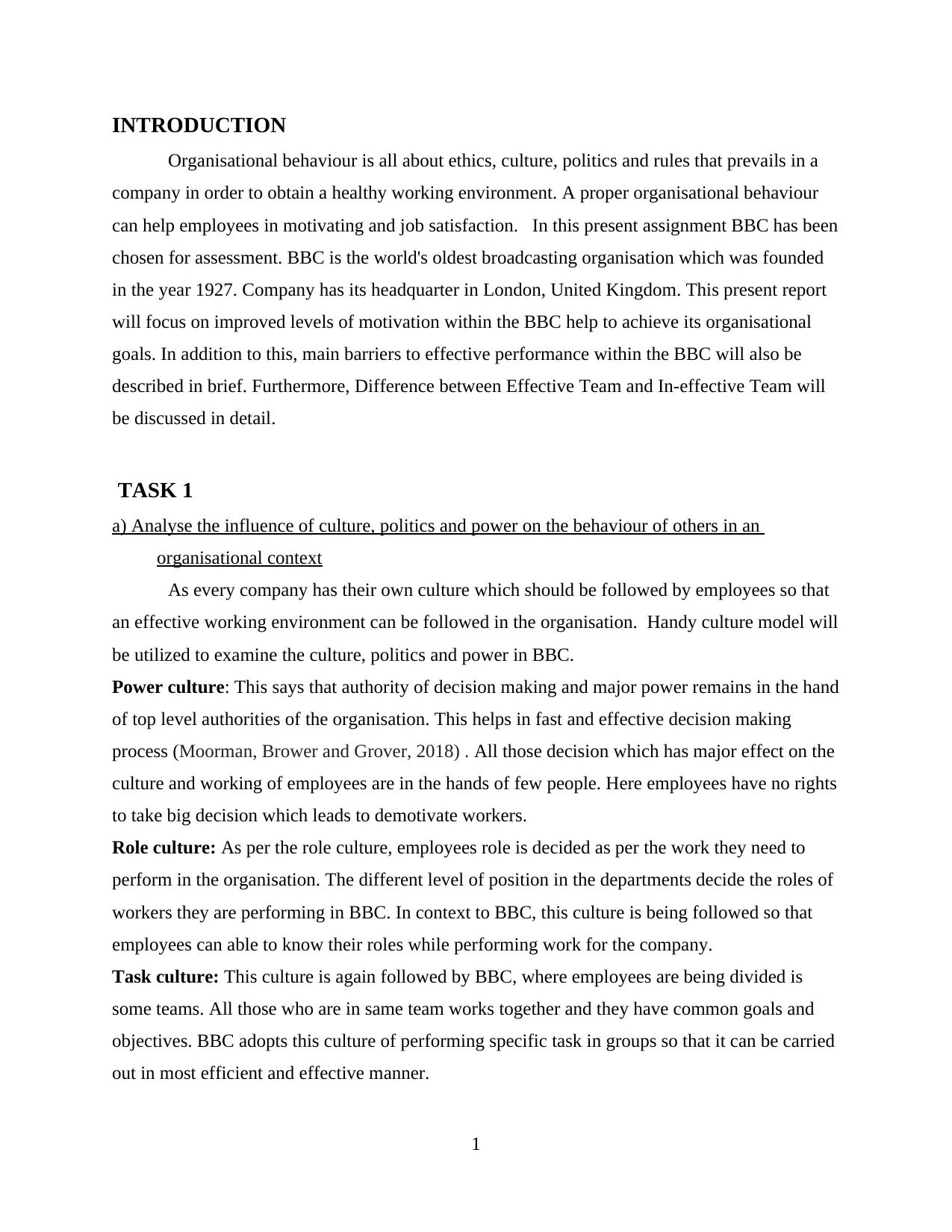
INTRODUCTION
Organisational behaviour is all about ethics, culture, politics and rules that prevails in a
company in order to obtain a healthy working environment. A proper organisational behaviour
can help employees in motivating and job satisfaction. In this present assignment BBC has been
chosen for assessment. BBC is the world's oldest broadcasting organisation which was founded
in the year 1927. Company has its headquarter in London, United Kingdom. This present report
will focus on improved levels of motivation within the BBC help to achieve its organisational
goals. In addition to this, main barriers to effective performance within the BBC will also be
described in brief. Furthermore, Difference between Effective Team and In-effective Team will
be discussed in detail.
TASK 1
a) Analyse the influence of culture, politics and power on the behaviour of others in an
organisational context
As every company has their own culture which should be followed by employees so that
an effective working environment can be followed in the organisation. Handy culture model will
be utilized to examine the culture, politics and power in BBC.
Power culture: This says that authority of decision making and major power remains in the hand
of top level authorities of the organisation. This helps in fast and effective decision making
process (Moorman, Brower and Grover, 2018) . All those decision which has major effect on the
culture and working of employees are in the hands of few people. Here employees have no rights
to take big decision which leads to demotivate workers.
Role culture: As per the role culture, employees role is decided as per the work they need to
perform in the organisation. The different level of position in the departments decide the roles of
workers they are performing in BBC. In context to BBC, this culture is being followed so that
employees can able to know their roles while performing work for the company.
Task culture: This culture is again followed by BBC, where employees are being divided is
some teams. All those who are in same team works together and they have common goals and
objectives. BBC adopts this culture of performing specific task in groups so that it can be carried
out in most efficient and effective manner.
1
Organisational behaviour is all about ethics, culture, politics and rules that prevails in a
company in order to obtain a healthy working environment. A proper organisational behaviour
can help employees in motivating and job satisfaction. In this present assignment BBC has been
chosen for assessment. BBC is the world's oldest broadcasting organisation which was founded
in the year 1927. Company has its headquarter in London, United Kingdom. This present report
will focus on improved levels of motivation within the BBC help to achieve its organisational
goals. In addition to this, main barriers to effective performance within the BBC will also be
described in brief. Furthermore, Difference between Effective Team and In-effective Team will
be discussed in detail.
TASK 1
a) Analyse the influence of culture, politics and power on the behaviour of others in an
organisational context
As every company has their own culture which should be followed by employees so that
an effective working environment can be followed in the organisation. Handy culture model will
be utilized to examine the culture, politics and power in BBC.
Power culture: This says that authority of decision making and major power remains in the hand
of top level authorities of the organisation. This helps in fast and effective decision making
process (Moorman, Brower and Grover, 2018) . All those decision which has major effect on the
culture and working of employees are in the hands of few people. Here employees have no rights
to take big decision which leads to demotivate workers.
Role culture: As per the role culture, employees role is decided as per the work they need to
perform in the organisation. The different level of position in the departments decide the roles of
workers they are performing in BBC. In context to BBC, this culture is being followed so that
employees can able to know their roles while performing work for the company.
Task culture: This culture is again followed by BBC, where employees are being divided is
some teams. All those who are in same team works together and they have common goals and
objectives. BBC adopts this culture of performing specific task in groups so that it can be carried
out in most efficient and effective manner.
1
⊘ This is a preview!⊘
Do you want full access?
Subscribe today to unlock all pages.

Trusted by 1+ million students worldwide
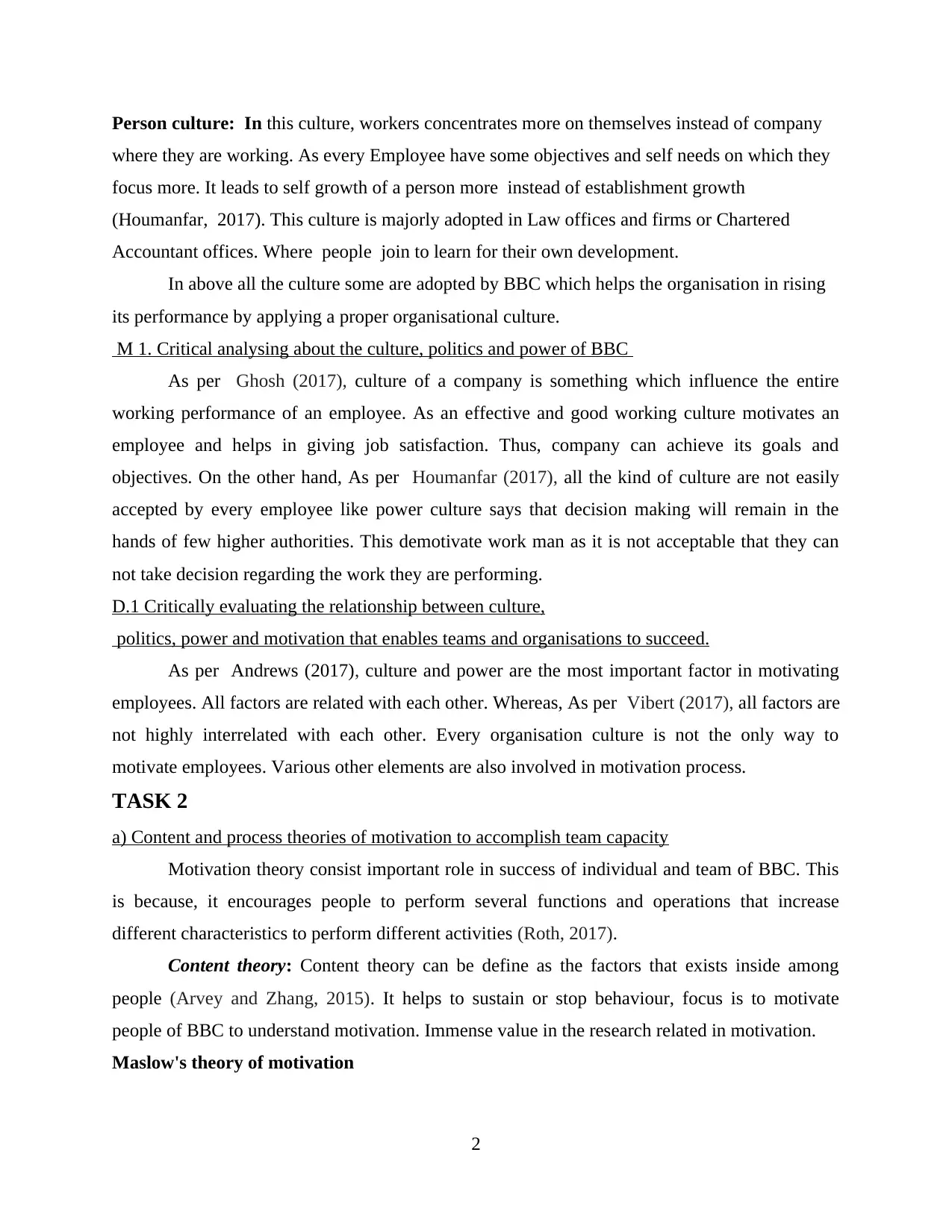
Person culture: In this culture, workers concentrates more on themselves instead of company
where they are working. As every Employee have some objectives and self needs on which they
focus more. It leads to self growth of a person more instead of establishment growth
(Houmanfar, 2017). This culture is majorly adopted in Law offices and firms or Chartered
Accountant offices. Where people join to learn for their own development.
In above all the culture some are adopted by BBC which helps the organisation in rising
its performance by applying a proper organisational culture.
M 1. Critical analysing about the culture, politics and power of BBC
As per Ghosh (2017), culture of a company is something which influence the entire
working performance of an employee. As an effective and good working culture motivates an
employee and helps in giving job satisfaction. Thus, company can achieve its goals and
objectives. On the other hand, As per Houmanfar (2017), all the kind of culture are not easily
accepted by every employee like power culture says that decision making will remain in the
hands of few higher authorities. This demotivate work man as it is not acceptable that they can
not take decision regarding the work they are performing.
D.1 Critically evaluating the relationship between culture,
politics, power and motivation that enables teams and organisations to succeed.
As per Andrews (2017), culture and power are the most important factor in motivating
employees. All factors are related with each other. Whereas, As per Vibert (2017), all factors are
not highly interrelated with each other. Every organisation culture is not the only way to
motivate employees. Various other elements are also involved in motivation process.
TASK 2
a) Content and process theories of motivation to accomplish team capacity
Motivation theory consist important role in success of individual and team of BBC. This
is because, it encourages people to perform several functions and operations that increase
different characteristics to perform different activities (Roth, 2017).
Content theory: Content theory can be define as the factors that exists inside among
people (Arvey and Zhang, 2015). It helps to sustain or stop behaviour, focus is to motivate
people of BBC to understand motivation. Immense value in the research related in motivation.
Maslow's theory of motivation
2
where they are working. As every Employee have some objectives and self needs on which they
focus more. It leads to self growth of a person more instead of establishment growth
(Houmanfar, 2017). This culture is majorly adopted in Law offices and firms or Chartered
Accountant offices. Where people join to learn for their own development.
In above all the culture some are adopted by BBC which helps the organisation in rising
its performance by applying a proper organisational culture.
M 1. Critical analysing about the culture, politics and power of BBC
As per Ghosh (2017), culture of a company is something which influence the entire
working performance of an employee. As an effective and good working culture motivates an
employee and helps in giving job satisfaction. Thus, company can achieve its goals and
objectives. On the other hand, As per Houmanfar (2017), all the kind of culture are not easily
accepted by every employee like power culture says that decision making will remain in the
hands of few higher authorities. This demotivate work man as it is not acceptable that they can
not take decision regarding the work they are performing.
D.1 Critically evaluating the relationship between culture,
politics, power and motivation that enables teams and organisations to succeed.
As per Andrews (2017), culture and power are the most important factor in motivating
employees. All factors are related with each other. Whereas, As per Vibert (2017), all factors are
not highly interrelated with each other. Every organisation culture is not the only way to
motivate employees. Various other elements are also involved in motivation process.
TASK 2
a) Content and process theories of motivation to accomplish team capacity
Motivation theory consist important role in success of individual and team of BBC. This
is because, it encourages people to perform several functions and operations that increase
different characteristics to perform different activities (Roth, 2017).
Content theory: Content theory can be define as the factors that exists inside among
people (Arvey and Zhang, 2015). It helps to sustain or stop behaviour, focus is to motivate
people of BBC to understand motivation. Immense value in the research related in motivation.
Maslow's theory of motivation
2
Paraphrase This Document
Need a fresh take? Get an instant paraphrase of this document with our AI Paraphraser
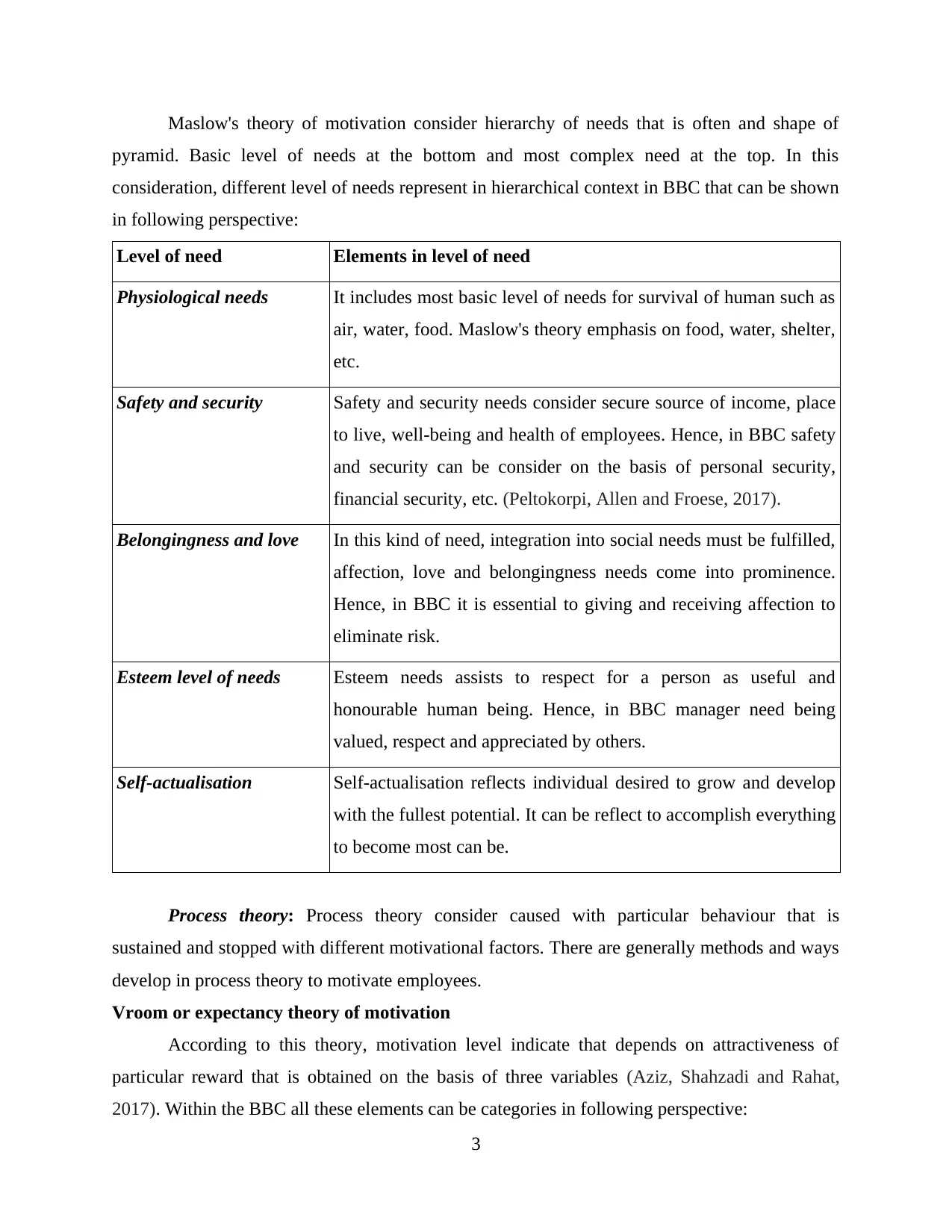
Maslow's theory of motivation consider hierarchy of needs that is often and shape of
pyramid. Basic level of needs at the bottom and most complex need at the top. In this
consideration, different level of needs represent in hierarchical context in BBC that can be shown
in following perspective:
Level of need Elements in level of need
Physiological needs It includes most basic level of needs for survival of human such as
air, water, food. Maslow's theory emphasis on food, water, shelter,
etc.
Safety and security Safety and security needs consider secure source of income, place
to live, well-being and health of employees. Hence, in BBC safety
and security can be consider on the basis of personal security,
financial security, etc. (Peltokorpi, Allen and Froese, 2017).
Belongingness and love In this kind of need, integration into social needs must be fulfilled,
affection, love and belongingness needs come into prominence.
Hence, in BBC it is essential to giving and receiving affection to
eliminate risk.
Esteem level of needs Esteem needs assists to respect for a person as useful and
honourable human being. Hence, in BBC manager need being
valued, respect and appreciated by others.
Self-actualisation Self-actualisation reflects individual desired to grow and develop
with the fullest potential. It can be reflect to accomplish everything
to become most can be.
Process theory: Process theory consider caused with particular behaviour that is
sustained and stopped with different motivational factors. There are generally methods and ways
develop in process theory to motivate employees.
Vroom or expectancy theory of motivation
According to this theory, motivation level indicate that depends on attractiveness of
particular reward that is obtained on the basis of three variables (Aziz, Shahzadi and Rahat,
2017). Within the BBC all these elements can be categories in following perspective:
3
pyramid. Basic level of needs at the bottom and most complex need at the top. In this
consideration, different level of needs represent in hierarchical context in BBC that can be shown
in following perspective:
Level of need Elements in level of need
Physiological needs It includes most basic level of needs for survival of human such as
air, water, food. Maslow's theory emphasis on food, water, shelter,
etc.
Safety and security Safety and security needs consider secure source of income, place
to live, well-being and health of employees. Hence, in BBC safety
and security can be consider on the basis of personal security,
financial security, etc. (Peltokorpi, Allen and Froese, 2017).
Belongingness and love In this kind of need, integration into social needs must be fulfilled,
affection, love and belongingness needs come into prominence.
Hence, in BBC it is essential to giving and receiving affection to
eliminate risk.
Esteem level of needs Esteem needs assists to respect for a person as useful and
honourable human being. Hence, in BBC manager need being
valued, respect and appreciated by others.
Self-actualisation Self-actualisation reflects individual desired to grow and develop
with the fullest potential. It can be reflect to accomplish everything
to become most can be.
Process theory: Process theory consider caused with particular behaviour that is
sustained and stopped with different motivational factors. There are generally methods and ways
develop in process theory to motivate employees.
Vroom or expectancy theory of motivation
According to this theory, motivation level indicate that depends on attractiveness of
particular reward that is obtained on the basis of three variables (Aziz, Shahzadi and Rahat,
2017). Within the BBC all these elements can be categories in following perspective:
3
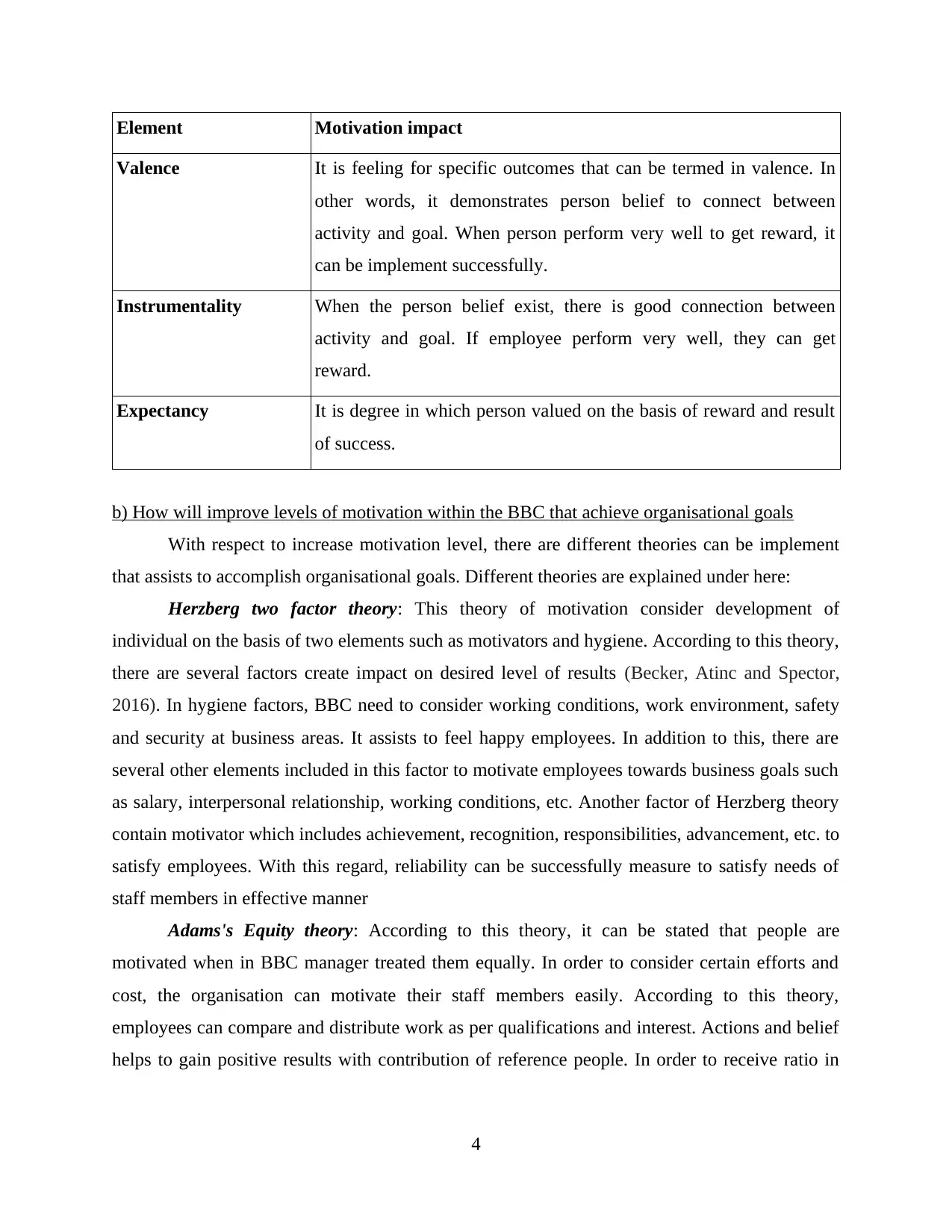
Element Motivation impact
Valence It is feeling for specific outcomes that can be termed in valence. In
other words, it demonstrates person belief to connect between
activity and goal. When person perform very well to get reward, it
can be implement successfully.
Instrumentality When the person belief exist, there is good connection between
activity and goal. If employee perform very well, they can get
reward.
Expectancy It is degree in which person valued on the basis of reward and result
of success.
b) How will improve levels of motivation within the BBC that achieve organisational goals
With respect to increase motivation level, there are different theories can be implement
that assists to accomplish organisational goals. Different theories are explained under here:
Herzberg two factor theory: This theory of motivation consider development of
individual on the basis of two elements such as motivators and hygiene. According to this theory,
there are several factors create impact on desired level of results (Becker, Atinc and Spector,
2016). In hygiene factors, BBC need to consider working conditions, work environment, safety
and security at business areas. It assists to feel happy employees. In addition to this, there are
several other elements included in this factor to motivate employees towards business goals such
as salary, interpersonal relationship, working conditions, etc. Another factor of Herzberg theory
contain motivator which includes achievement, recognition, responsibilities, advancement, etc. to
satisfy employees. With this regard, reliability can be successfully measure to satisfy needs of
staff members in effective manner
Adams's Equity theory: According to this theory, it can be stated that people are
motivated when in BBC manager treated them equally. In order to consider certain efforts and
cost, the organisation can motivate their staff members easily. According to this theory,
employees can compare and distribute work as per qualifications and interest. Actions and belief
helps to gain positive results with contribution of reference people. In order to receive ratio in
4
Valence It is feeling for specific outcomes that can be termed in valence. In
other words, it demonstrates person belief to connect between
activity and goal. When person perform very well to get reward, it
can be implement successfully.
Instrumentality When the person belief exist, there is good connection between
activity and goal. If employee perform very well, they can get
reward.
Expectancy It is degree in which person valued on the basis of reward and result
of success.
b) How will improve levels of motivation within the BBC that achieve organisational goals
With respect to increase motivation level, there are different theories can be implement
that assists to accomplish organisational goals. Different theories are explained under here:
Herzberg two factor theory: This theory of motivation consider development of
individual on the basis of two elements such as motivators and hygiene. According to this theory,
there are several factors create impact on desired level of results (Becker, Atinc and Spector,
2016). In hygiene factors, BBC need to consider working conditions, work environment, safety
and security at business areas. It assists to feel happy employees. In addition to this, there are
several other elements included in this factor to motivate employees towards business goals such
as salary, interpersonal relationship, working conditions, etc. Another factor of Herzberg theory
contain motivator which includes achievement, recognition, responsibilities, advancement, etc. to
satisfy employees. With this regard, reliability can be successfully measure to satisfy needs of
staff members in effective manner
Adams's Equity theory: According to this theory, it can be stated that people are
motivated when in BBC manager treated them equally. In order to consider certain efforts and
cost, the organisation can motivate their staff members easily. According to this theory,
employees can compare and distribute work as per qualifications and interest. Actions and belief
helps to gain positive results with contribution of reference people. In order to receive ratio in
4
⊘ This is a preview!⊘
Do you want full access?
Subscribe today to unlock all pages.

Trusted by 1+ million students worldwide
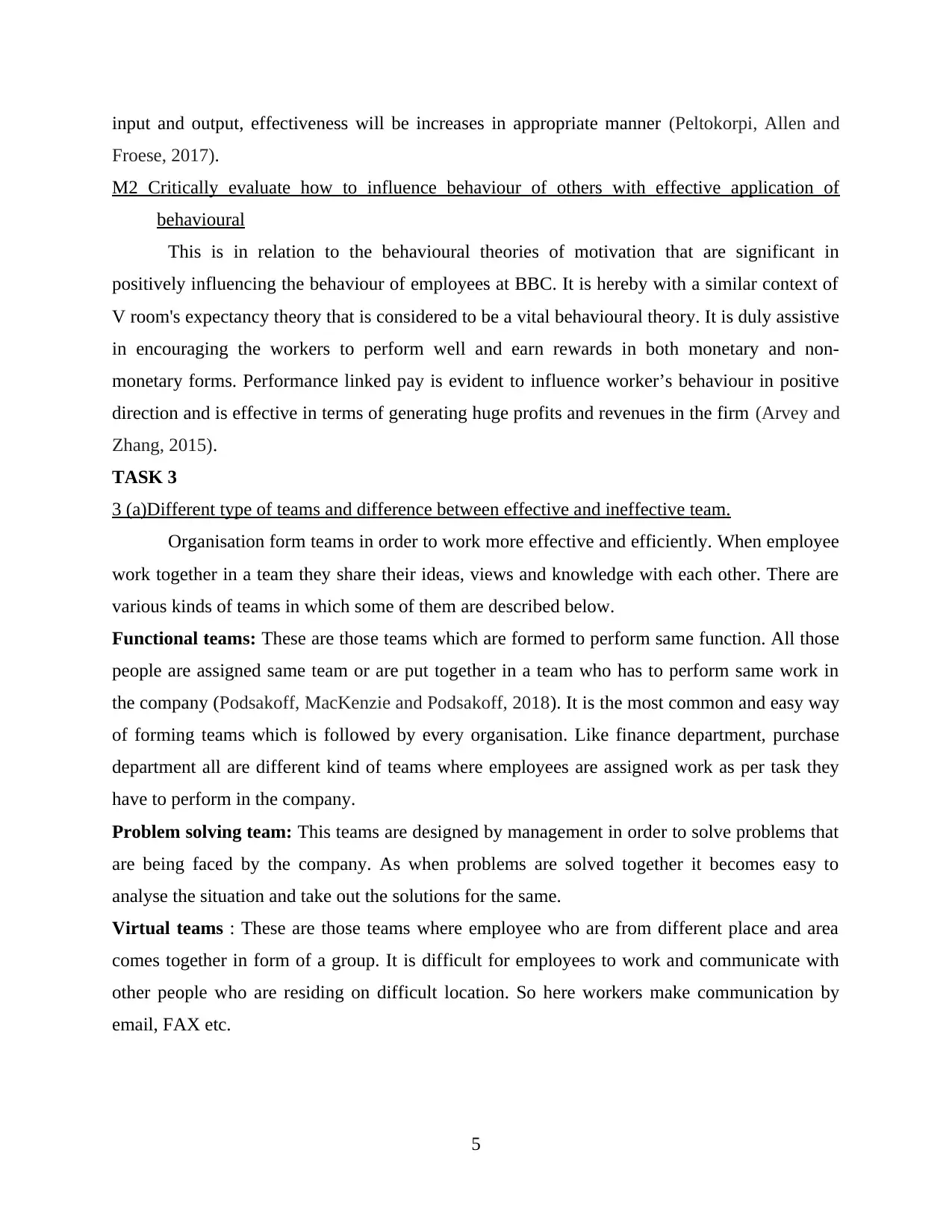
input and output, effectiveness will be increases in appropriate manner (Peltokorpi, Allen and
Froese, 2017).
M2 Critically evaluate how to influence behaviour of others with effective application of
behavioural
This is in relation to the behavioural theories of motivation that are significant in
positively influencing the behaviour of employees at BBC. It is hereby with a similar context of
V room's expectancy theory that is considered to be a vital behavioural theory. It is duly assistive
in encouraging the workers to perform well and earn rewards in both monetary and non-
monetary forms. Performance linked pay is evident to influence worker’s behaviour in positive
direction and is effective in terms of generating huge profits and revenues in the firm (Arvey and
Zhang, 2015).
TASK 3
3 (a)Different type of teams and difference between effective and ineffective team.
Organisation form teams in order to work more effective and efficiently. When employee
work together in a team they share their ideas, views and knowledge with each other. There are
various kinds of teams in which some of them are described below.
Functional teams: These are those teams which are formed to perform same function. All those
people are assigned same team or are put together in a team who has to perform same work in
the company (Podsakoff, MacKenzie and Podsakoff, 2018). It is the most common and easy way
of forming teams which is followed by every organisation. Like finance department, purchase
department all are different kind of teams where employees are assigned work as per task they
have to perform in the company.
Problem solving team: This teams are designed by management in order to solve problems that
are being faced by the company. As when problems are solved together it becomes easy to
analyse the situation and take out the solutions for the same.
Virtual teams : These are those teams where employee who are from different place and area
comes together in form of a group. It is difficult for employees to work and communicate with
other people who are residing on difficult location. So here workers make communication by
email, FAX etc.
5
Froese, 2017).
M2 Critically evaluate how to influence behaviour of others with effective application of
behavioural
This is in relation to the behavioural theories of motivation that are significant in
positively influencing the behaviour of employees at BBC. It is hereby with a similar context of
V room's expectancy theory that is considered to be a vital behavioural theory. It is duly assistive
in encouraging the workers to perform well and earn rewards in both monetary and non-
monetary forms. Performance linked pay is evident to influence worker’s behaviour in positive
direction and is effective in terms of generating huge profits and revenues in the firm (Arvey and
Zhang, 2015).
TASK 3
3 (a)Different type of teams and difference between effective and ineffective team.
Organisation form teams in order to work more effective and efficiently. When employee
work together in a team they share their ideas, views and knowledge with each other. There are
various kinds of teams in which some of them are described below.
Functional teams: These are those teams which are formed to perform same function. All those
people are assigned same team or are put together in a team who has to perform same work in
the company (Podsakoff, MacKenzie and Podsakoff, 2018). It is the most common and easy way
of forming teams which is followed by every organisation. Like finance department, purchase
department all are different kind of teams where employees are assigned work as per task they
have to perform in the company.
Problem solving team: This teams are designed by management in order to solve problems that
are being faced by the company. As when problems are solved together it becomes easy to
analyse the situation and take out the solutions for the same.
Virtual teams : These are those teams where employee who are from different place and area
comes together in form of a group. It is difficult for employees to work and communicate with
other people who are residing on difficult location. So here workers make communication by
email, FAX etc.
5
Paraphrase This Document
Need a fresh take? Get an instant paraphrase of this document with our AI Paraphraser
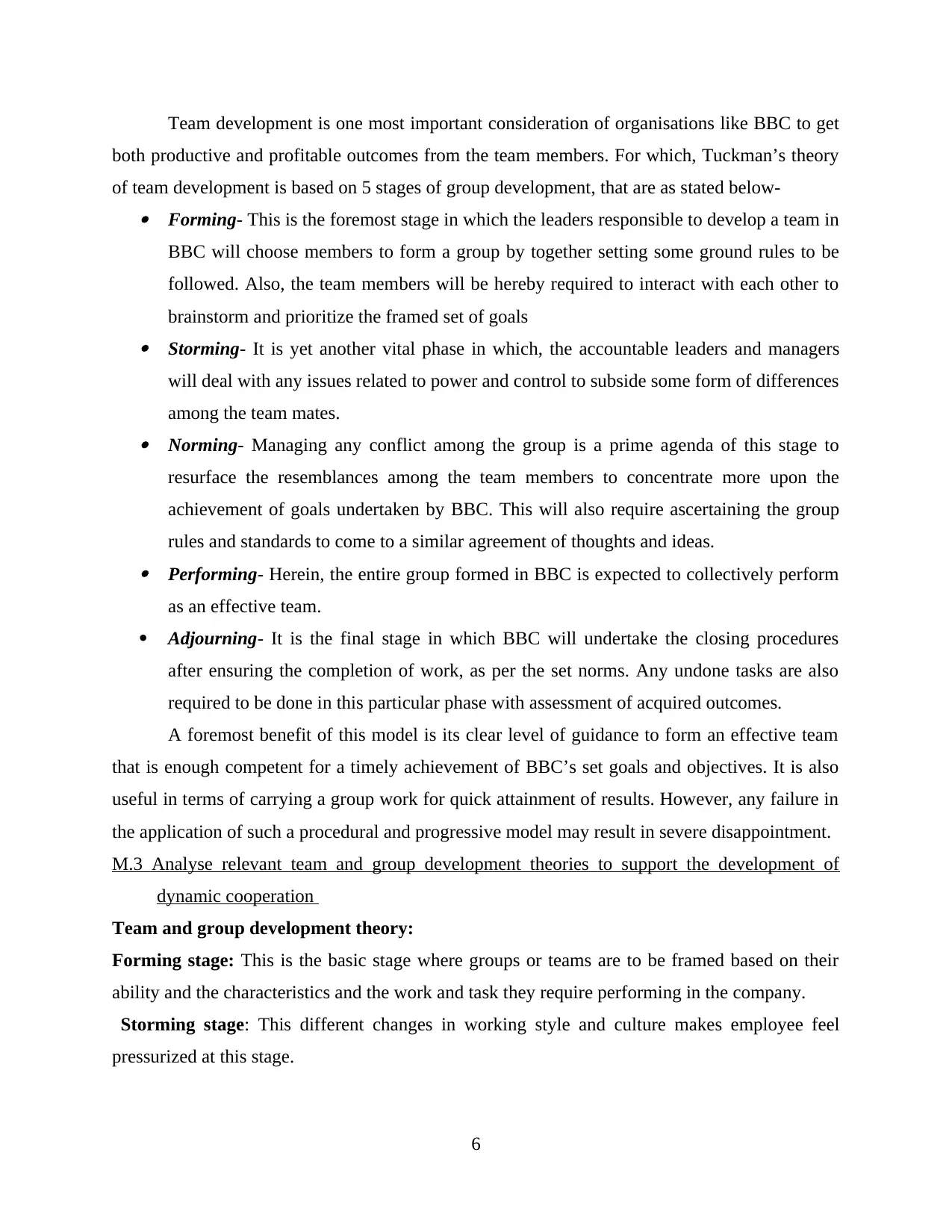
Team development is one most important consideration of organisations like BBC to get
both productive and profitable outcomes from the team members. For which, Tuckman’s theory
of team development is based on 5 stages of group development, that are as stated below- Forming- This is the foremost stage in which the leaders responsible to develop a team in
BBC will choose members to form a group by together setting some ground rules to be
followed. Also, the team members will be hereby required to interact with each other to
brainstorm and prioritize the framed set of goals Storming- It is yet another vital phase in which, the accountable leaders and managers
will deal with any issues related to power and control to subside some form of differences
among the team mates. Norming- Managing any conflict among the group is a prime agenda of this stage to
resurface the resemblances among the team members to concentrate more upon the
achievement of goals undertaken by BBC. This will also require ascertaining the group
rules and standards to come to a similar agreement of thoughts and ideas. Performing- Herein, the entire group formed in BBC is expected to collectively perform
as an effective team.
Adjourning- It is the final stage in which BBC will undertake the closing procedures
after ensuring the completion of work, as per the set norms. Any undone tasks are also
required to be done in this particular phase with assessment of acquired outcomes.
A foremost benefit of this model is its clear level of guidance to form an effective team
that is enough competent for a timely achievement of BBC’s set goals and objectives. It is also
useful in terms of carrying a group work for quick attainment of results. However, any failure in
the application of such a procedural and progressive model may result in severe disappointment.
M.3 Analyse relevant team and group development theories to support the development of
dynamic cooperation
Team and group development theory:
Forming stage: This is the basic stage where groups or teams are to be framed based on their
ability and the characteristics and the work and task they require performing in the company.
Storming stage: This different changes in working style and culture makes employee feel
pressurized at this stage.
6
both productive and profitable outcomes from the team members. For which, Tuckman’s theory
of team development is based on 5 stages of group development, that are as stated below- Forming- This is the foremost stage in which the leaders responsible to develop a team in
BBC will choose members to form a group by together setting some ground rules to be
followed. Also, the team members will be hereby required to interact with each other to
brainstorm and prioritize the framed set of goals Storming- It is yet another vital phase in which, the accountable leaders and managers
will deal with any issues related to power and control to subside some form of differences
among the team mates. Norming- Managing any conflict among the group is a prime agenda of this stage to
resurface the resemblances among the team members to concentrate more upon the
achievement of goals undertaken by BBC. This will also require ascertaining the group
rules and standards to come to a similar agreement of thoughts and ideas. Performing- Herein, the entire group formed in BBC is expected to collectively perform
as an effective team.
Adjourning- It is the final stage in which BBC will undertake the closing procedures
after ensuring the completion of work, as per the set norms. Any undone tasks are also
required to be done in this particular phase with assessment of acquired outcomes.
A foremost benefit of this model is its clear level of guidance to form an effective team
that is enough competent for a timely achievement of BBC’s set goals and objectives. It is also
useful in terms of carrying a group work for quick attainment of results. However, any failure in
the application of such a procedural and progressive model may result in severe disappointment.
M.3 Analyse relevant team and group development theories to support the development of
dynamic cooperation
Team and group development theory:
Forming stage: This is the basic stage where groups or teams are to be framed based on their
ability and the characteristics and the work and task they require performing in the company.
Storming stage: This different changes in working style and culture makes employee feel
pressurized at this stage.
6
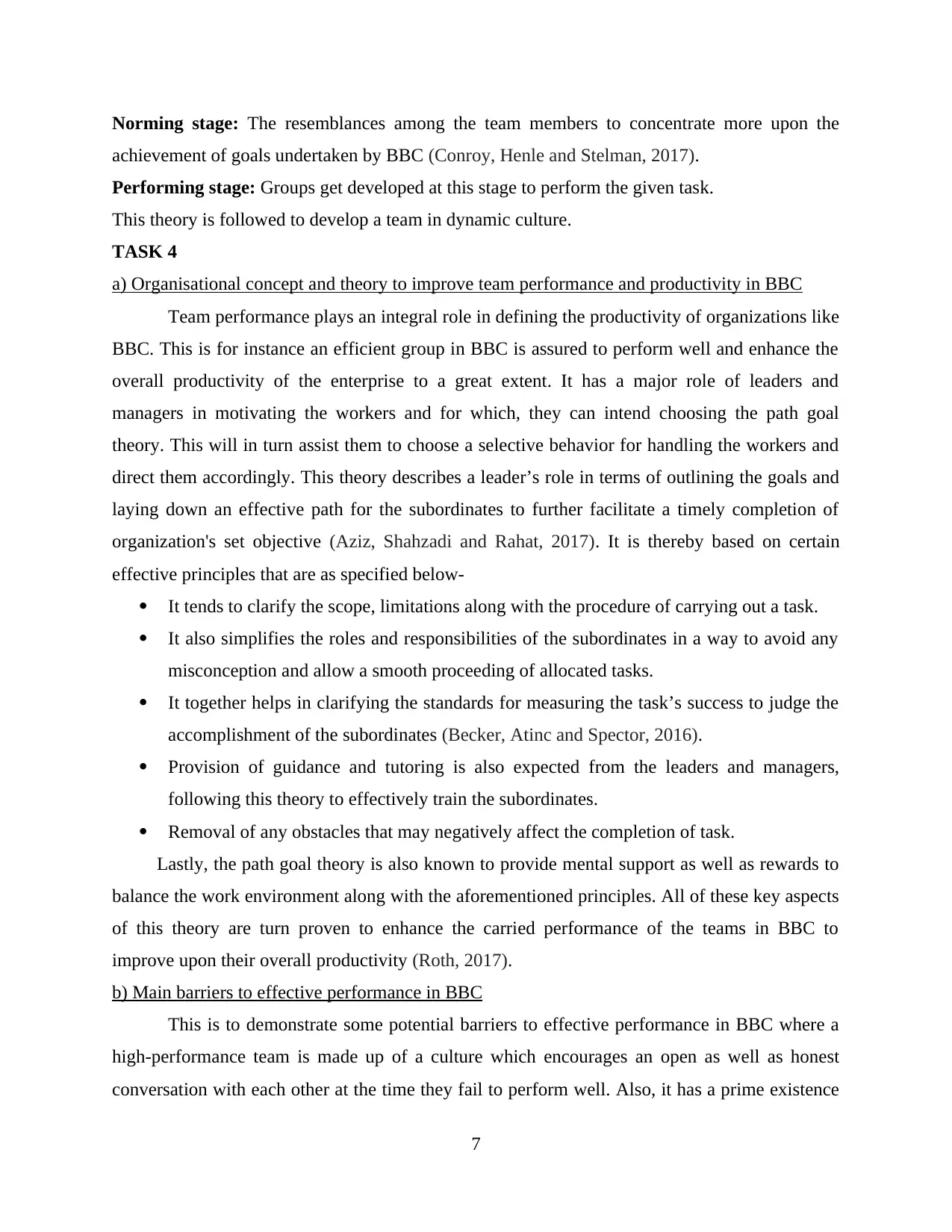
Norming stage: The resemblances among the team members to concentrate more upon the
achievement of goals undertaken by BBC (Conroy, Henle and Stelman, 2017).
Performing stage: Groups get developed at this stage to perform the given task.
This theory is followed to develop a team in dynamic culture.
TASK 4
a) Organisational concept and theory to improve team performance and productivity in BBC
Team performance plays an integral role in defining the productivity of organizations like
BBC. This is for instance an efficient group in BBC is assured to perform well and enhance the
overall productivity of the enterprise to a great extent. It has a major role of leaders and
managers in motivating the workers and for which, they can intend choosing the path goal
theory. This will in turn assist them to choose a selective behavior for handling the workers and
direct them accordingly. This theory describes a leader’s role in terms of outlining the goals and
laying down an effective path for the subordinates to further facilitate a timely completion of
organization's set objective (Aziz, Shahzadi and Rahat, 2017). It is thereby based on certain
effective principles that are as specified below-
It tends to clarify the scope, limitations along with the procedure of carrying out a task.
It also simplifies the roles and responsibilities of the subordinates in a way to avoid any
misconception and allow a smooth proceeding of allocated tasks.
It together helps in clarifying the standards for measuring the task’s success to judge the
accomplishment of the subordinates (Becker, Atinc and Spector, 2016).
Provision of guidance and tutoring is also expected from the leaders and managers,
following this theory to effectively train the subordinates.
Removal of any obstacles that may negatively affect the completion of task.
Lastly, the path goal theory is also known to provide mental support as well as rewards to
balance the work environment along with the aforementioned principles. All of these key aspects
of this theory are turn proven to enhance the carried performance of the teams in BBC to
improve upon their overall productivity (Roth, 2017).
b) Main barriers to effective performance in BBC
This is to demonstrate some potential barriers to effective performance in BBC where a
high-performance team is made up of a culture which encourages an open as well as honest
conversation with each other at the time they fail to perform well. Also, it has a prime existence
7
achievement of goals undertaken by BBC (Conroy, Henle and Stelman, 2017).
Performing stage: Groups get developed at this stage to perform the given task.
This theory is followed to develop a team in dynamic culture.
TASK 4
a) Organisational concept and theory to improve team performance and productivity in BBC
Team performance plays an integral role in defining the productivity of organizations like
BBC. This is for instance an efficient group in BBC is assured to perform well and enhance the
overall productivity of the enterprise to a great extent. It has a major role of leaders and
managers in motivating the workers and for which, they can intend choosing the path goal
theory. This will in turn assist them to choose a selective behavior for handling the workers and
direct them accordingly. This theory describes a leader’s role in terms of outlining the goals and
laying down an effective path for the subordinates to further facilitate a timely completion of
organization's set objective (Aziz, Shahzadi and Rahat, 2017). It is thereby based on certain
effective principles that are as specified below-
It tends to clarify the scope, limitations along with the procedure of carrying out a task.
It also simplifies the roles and responsibilities of the subordinates in a way to avoid any
misconception and allow a smooth proceeding of allocated tasks.
It together helps in clarifying the standards for measuring the task’s success to judge the
accomplishment of the subordinates (Becker, Atinc and Spector, 2016).
Provision of guidance and tutoring is also expected from the leaders and managers,
following this theory to effectively train the subordinates.
Removal of any obstacles that may negatively affect the completion of task.
Lastly, the path goal theory is also known to provide mental support as well as rewards to
balance the work environment along with the aforementioned principles. All of these key aspects
of this theory are turn proven to enhance the carried performance of the teams in BBC to
improve upon their overall productivity (Roth, 2017).
b) Main barriers to effective performance in BBC
This is to demonstrate some potential barriers to effective performance in BBC where a
high-performance team is made up of a culture which encourages an open as well as honest
conversation with each other at the time they fail to perform well. Also, it has a prime existence
7
⊘ This is a preview!⊘
Do you want full access?
Subscribe today to unlock all pages.

Trusted by 1+ million students worldwide
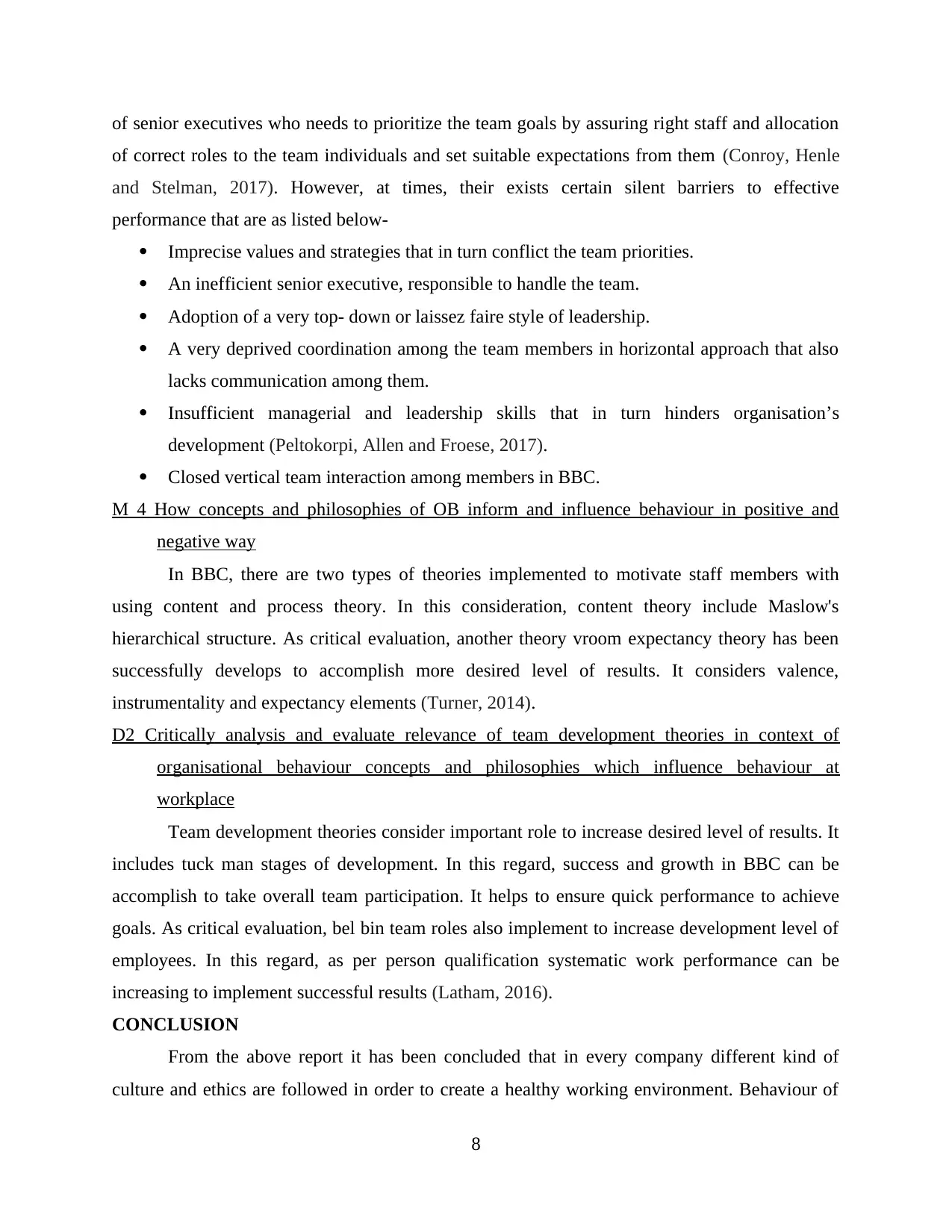
of senior executives who needs to prioritize the team goals by assuring right staff and allocation
of correct roles to the team individuals and set suitable expectations from them (Conroy, Henle
and Stelman, 2017). However, at times, their exists certain silent barriers to effective
performance that are as listed below-
Imprecise values and strategies that in turn conflict the team priorities.
An inefficient senior executive, responsible to handle the team.
Adoption of a very top- down or laissez faire style of leadership.
A very deprived coordination among the team members in horizontal approach that also
lacks communication among them.
Insufficient managerial and leadership skills that in turn hinders organisation’s
development (Peltokorpi, Allen and Froese, 2017).
Closed vertical team interaction among members in BBC.
M 4 How concepts and philosophies of OB inform and influence behaviour in positive and
negative way
In BBC, there are two types of theories implemented to motivate staff members with
using content and process theory. In this consideration, content theory include Maslow's
hierarchical structure. As critical evaluation, another theory vroom expectancy theory has been
successfully develops to accomplish more desired level of results. It considers valence,
instrumentality and expectancy elements (Turner, 2014).
D2 Critically analysis and evaluate relevance of team development theories in context of
organisational behaviour concepts and philosophies which influence behaviour at
workplace
Team development theories consider important role to increase desired level of results. It
includes tuck man stages of development. In this regard, success and growth in BBC can be
accomplish to take overall team participation. It helps to ensure quick performance to achieve
goals. As critical evaluation, bel bin team roles also implement to increase development level of
employees. In this regard, as per person qualification systematic work performance can be
increasing to implement successful results (Latham, 2016).
CONCLUSION
From the above report it has been concluded that in every company different kind of
culture and ethics are followed in order to create a healthy working environment. Behaviour of
8
of correct roles to the team individuals and set suitable expectations from them (Conroy, Henle
and Stelman, 2017). However, at times, their exists certain silent barriers to effective
performance that are as listed below-
Imprecise values and strategies that in turn conflict the team priorities.
An inefficient senior executive, responsible to handle the team.
Adoption of a very top- down or laissez faire style of leadership.
A very deprived coordination among the team members in horizontal approach that also
lacks communication among them.
Insufficient managerial and leadership skills that in turn hinders organisation’s
development (Peltokorpi, Allen and Froese, 2017).
Closed vertical team interaction among members in BBC.
M 4 How concepts and philosophies of OB inform and influence behaviour in positive and
negative way
In BBC, there are two types of theories implemented to motivate staff members with
using content and process theory. In this consideration, content theory include Maslow's
hierarchical structure. As critical evaluation, another theory vroom expectancy theory has been
successfully develops to accomplish more desired level of results. It considers valence,
instrumentality and expectancy elements (Turner, 2014).
D2 Critically analysis and evaluate relevance of team development theories in context of
organisational behaviour concepts and philosophies which influence behaviour at
workplace
Team development theories consider important role to increase desired level of results. It
includes tuck man stages of development. In this regard, success and growth in BBC can be
accomplish to take overall team participation. It helps to ensure quick performance to achieve
goals. As critical evaluation, bel bin team roles also implement to increase development level of
employees. In this regard, as per person qualification systematic work performance can be
increasing to implement successful results (Latham, 2016).
CONCLUSION
From the above report it has been concluded that in every company different kind of
culture and ethics are followed in order to create a healthy working environment. Behaviour of
8
Paraphrase This Document
Need a fresh take? Get an instant paraphrase of this document with our AI Paraphraser

people helps the organisation in attaining its goals and objectives. In addition to this, different
theories of motivation helps in motivating employees in performing better work. Other than this,
Organisation form teams in order to work more effective and efficiently. When employee work
together in a team they share their ideas, views and knowledge with each other. Furthermore,
there are various problems faced by the companies which can be solved by forming different
teams such as problem solving teams, virtual teams etc.
9
theories of motivation helps in motivating employees in performing better work. Other than this,
Organisation form teams in order to work more effective and efficiently. When employee work
together in a team they share their ideas, views and knowledge with each other. Furthermore,
there are various problems faced by the companies which can be solved by forming different
teams such as problem solving teams, virtual teams etc.
9

REFERENCES
Books and Journals
Latham, G.P., 2016. Goal setting: A possible theoretical framework for examining the effect of
priming goals on organizational behavior. Current Opinion in Psychology. 12. pp.85-88.
Baum, J.R., Frese, M. and Baron, R.A. eds., 2014. The psychology of entrepreneurship.
Psychology Press.
Turner, B.A. ed., 2014. Organizational symbolism (Vol. 19). Walter de Gruyter GmbH & Co
KG.
Peltokorpi, V., Allen, D.G. and Froese, F., 2017. Erratum: Organizational embeddedness,
turnover intentions, and voluntary turnover: The moderating effects of employee
demographic characteristics and value orientations. Journal of Organizational
Behavior. 38(4). pp.612-612.
Conroy, S., Henle, C.A. and Stelman, S., 2017. Where there is light, there is dark: A review of
the detrimental outcomes of high organizational identification. Journal of organizational
behavior. 38(2). pp.184-203.
Roth, J., 2017. How to Audit Culture: culture audits can help practitioners gain insight into the
causes of poor organizational behavior. Internal Auditor. 74(3). pp.30-36.
Becker, T.E., Atinc, G. and Spector, P.E., 2016. Statistical control in correlational studies: 10
essential recommendations for organizational researchers. Journal of Organizational
Behavior. 37(2). pp.157-167.
Aziz, K., Shahzadi, I. and Rahat, Q., 2017. Does Abusive Supervision Influence Organizational
Citizenship Behavior? Testing the Mediation Effects of Organizational
Cynicism. International Journal of Management Excellence. 9(3). pp.1146-1154.
Arvey, R.D. and Zhang, Z., 2015. Biological factors in organizational behavior and I/O
psychology: An introduction to the special section. Applied Psychology. 64(2). pp.281-
285.
Blader, S.L., Patil, S. and Packer, D.J., 2017. Organizational identification and workplace
behavior: More than meets the eye. Research in Organizational Behavior.
Moorman, R., Brower, H. and Grover, S., 2018. Organizational Citizenship Behavior and Trust:
The Double Reinforcing Spiral. The Oxford Handbook of Organizational Citizenship
Behavior, p.285.
10
Books and Journals
Latham, G.P., 2016. Goal setting: A possible theoretical framework for examining the effect of
priming goals on organizational behavior. Current Opinion in Psychology. 12. pp.85-88.
Baum, J.R., Frese, M. and Baron, R.A. eds., 2014. The psychology of entrepreneurship.
Psychology Press.
Turner, B.A. ed., 2014. Organizational symbolism (Vol. 19). Walter de Gruyter GmbH & Co
KG.
Peltokorpi, V., Allen, D.G. and Froese, F., 2017. Erratum: Organizational embeddedness,
turnover intentions, and voluntary turnover: The moderating effects of employee
demographic characteristics and value orientations. Journal of Organizational
Behavior. 38(4). pp.612-612.
Conroy, S., Henle, C.A. and Stelman, S., 2017. Where there is light, there is dark: A review of
the detrimental outcomes of high organizational identification. Journal of organizational
behavior. 38(2). pp.184-203.
Roth, J., 2017. How to Audit Culture: culture audits can help practitioners gain insight into the
causes of poor organizational behavior. Internal Auditor. 74(3). pp.30-36.
Becker, T.E., Atinc, G. and Spector, P.E., 2016. Statistical control in correlational studies: 10
essential recommendations for organizational researchers. Journal of Organizational
Behavior. 37(2). pp.157-167.
Aziz, K., Shahzadi, I. and Rahat, Q., 2017. Does Abusive Supervision Influence Organizational
Citizenship Behavior? Testing the Mediation Effects of Organizational
Cynicism. International Journal of Management Excellence. 9(3). pp.1146-1154.
Arvey, R.D. and Zhang, Z., 2015. Biological factors in organizational behavior and I/O
psychology: An introduction to the special section. Applied Psychology. 64(2). pp.281-
285.
Blader, S.L., Patil, S. and Packer, D.J., 2017. Organizational identification and workplace
behavior: More than meets the eye. Research in Organizational Behavior.
Moorman, R., Brower, H. and Grover, S., 2018. Organizational Citizenship Behavior and Trust:
The Double Reinforcing Spiral. The Oxford Handbook of Organizational Citizenship
Behavior, p.285.
10
⊘ This is a preview!⊘
Do you want full access?
Subscribe today to unlock all pages.

Trusted by 1+ million students worldwide
1 out of 13
Related Documents
Your All-in-One AI-Powered Toolkit for Academic Success.
+13062052269
info@desklib.com
Available 24*7 on WhatsApp / Email
![[object Object]](/_next/static/media/star-bottom.7253800d.svg)
Unlock your academic potential
Copyright © 2020–2025 A2Z Services. All Rights Reserved. Developed and managed by ZUCOL.





